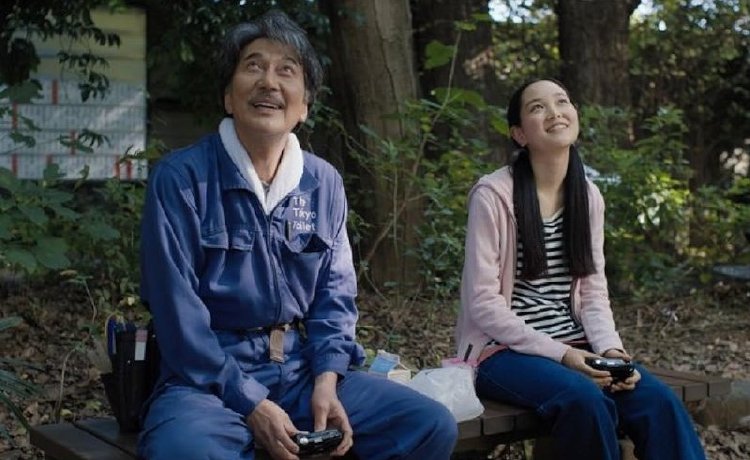Perfect Days

Hirayama (Kôji Yakusho, "Shall We Dance?"), a man in his mid-sixties, finds perfect contentment in the small pleasures of life – a job well done, helping others, music, books and nature. He enjoys a routine, but when outsiders, like his The Tokyo Toilet coworker Takashi (Tokio Emoto, "Cube") disrupt it, Hirayama quietly finds his way back to his “Perfect Days.”
Laura's Review: A
An unusual path led to this sublime character study when German director Wim Wenders ("Wings of Desire") was asked to make a documentary about Shibuya’s 17 public restrooms, which had been made into unique works of art by some of Japan’s most prominent architects as part of a Nippon Foundation project in 2018. Inspired by their beauty (one has different colored transparent stalls which turn opaque when occupied, another projects glowing patterns while yet another looks like a grouping of modernist huts), Wenders instead, along with cowriter Takuma Takasaki, came up with an idea for a fictional film about a man who cleans these toilets for a living, his lead character’s name taken from Ozu’s “Tokyo Story,” a film dear to Wenders’ heart.
Every morning, Hirayama, who lives simply, awakens happily to the sound of a woman sweeping the street, her routine as dependable as his. After misting the saplings he tends to, he procures a drink from a vending machine outside and hops into an old van outfitted with a cassette player and chooses one of his vintage tapes from the 60’s and 70’s (the film’s title is a Lou Reed song featured herein). He follows a route, systemically cleaning the public spaces while taking care of the little things that pop up. A crying child is led back to its mother. He mimes one toilet’s operation to an American tourist confounded by the transparent stalls who giggles in delight once shown and finds his own delight in a hidden game of tic-tac-toe, which he marks a move on and slides back into its hiding place to pick up again the next day.
Throughout the film, Hirayama will have four significant encounters with other people. The much younger Takashi who is always late and always broke asks to borrow his coworker’s van to take his girlfriend, Aya (Aoi Yamada) on a date. With the older man sitting in the back seat, Aya becomes interested in Hirayama’s musical archive while Takashi hones in on its value, trying to convince the older man to sell, but Takashi values the music more than the money and has found a friend in Aya who he turns on to Patti Smith. Next his runaway niece, Niko (Arisa Nakano), descends on him unexpectedly and, not knowing what else to do, Hirayama takes her with him to work and she not only chips in, but sits with him in his peaceful lunchtime spot, admiring the trees he often photographs. She also has to be shown how to put a cassette tape into the player (cue up Van Morrison’s ‘Brown Eyed Girl’). When her mother, Hirayama’s sister Keiko (Yumi Asô), arrives to fetch her in a chauffeured car, her obvious wealth gives us a clue into Hirayama’s own past. She asks if he’s ‘really cleaning toilets’ and for him to visit their father.
Hirayama will break from his usual routine the most in late goings, having to train a new employee when Takashi quits and visiting a quiet local restaurant where he appears to be known by its proprietress. When he returns and sees her in the arms of a man, he retreats. That man will join him for a cigarette and a shared moment. Hirayama may speak little, but he notices much, all movingly conveyed by Cannes Best Actor winner Yakusho, who is the essence of compassionate Zen. That Wenders conjured such poetry and soul inspired by public toilets, no matter how architectural, was a stroke of genius. “Perfect Days” is a marvel.
Robin's Review: A-
Neon qualified "Perfect Days" for 2023 awards with an 11/10/23 engagement. Its regular theatrical engagement begins on 2/7/24.

